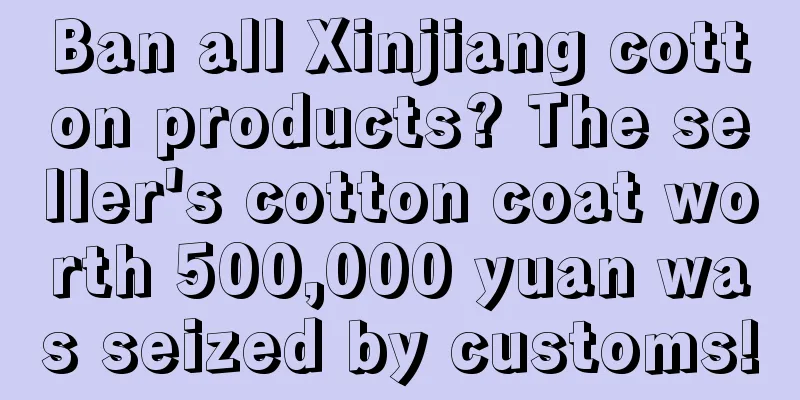Ban all Xinjiang cotton products? The seller's cotton coat worth 500,000 yuan was seized by customs!

|
▶ Video account attention cross-border navigation It is learned that the U.S. Uyghur Forced Labor Prevention Act (UFLPA) officially came into effect on June 21. According to the bill, the U.S. Customs will impose an import ban on goods from China's Xinjiang region and conduct strict traceability inspections on related products. Relevant companies need to provide purchase orders and invoices for cotton products such as cotton yarn and cotton cloth.
According to people familiar with the matter, a number of coastal cotton textile export companies have been fined for being found to have "used Xinjiang cotton in products exported to the United States."
It seems that the export situation of Xinjiang cotton products is already very serious. However, it is learned that judging from the sales of Xinjiang cotton-related products recently, overseas consumers' feelings about this policy are more like: This duck is dead, but its mouth is hard.
It is learned that recently, in order to boycott Xinjiang cotton, two foreign human rights organizations sued the British government on the grounds that it failed to prevent the import of Xinjiang cotton products.
▲ The picture comes from foreign media These organizations agree with the US's "Lies Act" and believe that Xinjiang cotton products use "forced labor" in the production process. Therefore, they chose to boycott Chinese cotton textiles and demanded a lawsuit against the British government for not refusing to import related products.
From this point of view, the boycott of Xinjiang cotton seems to be in full swing overseas. However, the recent popularity of domestic heating devices in Europe contradicts this action.
As the cold wave approaches, energy shortages and continued inflation have led to a surge in demand for high-quality and low-cost Chinese heating products among European people.
From September to now, topics such as #Europeans buy up Chinese electric blankets# and #Chinese eight-piece winter sets are bought up by Europe# have frequently appeared on hot searches, proving that domestic winter gadgets such as electric blankets, hot water bottles, thermal underwear and thermal gloves are making a high-profile entry into the lives of European people.
▲ The picture comes from AliExpress Amid the heated discussion on #how long will the boom in domestic heating products last#, some sharp sellers have noticed that many categories of these domestic heating products contain Xinjiang cotton.
▲ The picture comes from Weibo For this reason, many sellers have complained: “The origin should be marked as Xinjiang in the most prominent place.” "You say no with your mouth, but your body is honest. Is this the legendary Western ideology?"
In addition to Europe, the United States, which proposed the relevant laws, also has similar "double standards" behavior.
It is learned that the U.S. Forced Uyghur Labor Prevention Act, which came into effect on June 21, clearly stated that DNA testing will be conducted on goods from China's Xinjiang region at customs . However, based on current technical conditions, the feasibility of conducting DNA testing on large quantities of imported cotton textiles is not high.
Although relevant personnel pointed out that a technology company called "Altana" in the United States published "Illuminating Xinjiang's Forced Labor Ecosystem" on its website, attempting to detect the so-called DNA by tracing the supply chain. But Liv Simpliciano of Fashion Revolution said Xinjiang cotton was ubiquitous in the supply chain : “At the ginning stage [when the fibre is separated from the seed], cotton from different locations is mixed together and it is impossible to trace its origin.”
▲ The picture comes from foreign media In addition, just one month after the bill came into effect, statistics from China Customs showed that Xinjiang’s clothing exports to the United States surged to the highest point in nearly two years in July, with sales exceeding US$6 million , of which Christmas decorations were Xinjiang’s largest single export product to the United States, with a value of more than US$1.5 million. This data undoubtedly slapped the faces of American experts. It can be seen that under the current circumstances, this lie bill of the United States is not only "unreasonable" but also "powerless."
However, for cross-border sellers selling related products, the impact of this bill does exist. It is learned that a few days ago, a seller reported that a batch of winter cotton clothes worth 500,000 yuan were detained and inspected by the U.S. Customs due to issues with Xinjiang cotton.
▲ The picture comes from Zhiwubuyan The seller said that there was no word "cotton" on the customs declaration information and product labels of this batch of goods, and the material was polyester fiber (synthetic cotton) . Since it was a seasonal product, if the relevant certification documents were not submitted in time, this batch of goods might be scrapped.
Many sellers are very angry about this: "The United States is really playing dirty tricks. It's going to be difficult to deal with." "How do we deal with this? The loss is huge. My God, it's so hard to do business these days." "I've always heard from the freight forwarder that this will be strictly checked, it's true!!"
Some sellers also pointed out that cotton products shipped to Amazon are relatively less concerned by U.S. Customs. Sellers shipping to overseas warehouses should be more cautious and made relevant suggestions: In this regard, it was also mentioned in the article "The US Customs Ban is about to take effect! Banning all Xinjiang cotton products?" that in order to avoid being seized by customs and affecting the delivery time , the following certification documents must be prepared in advance when exporting relevant cotton products: |
Recommend
U.S. e-commerce sales grew 6.6% in the second quarter, and the growth rate continued to slow
It is learned that recently, according to foreign ...
What is iPayLinks? iPayLinks Review
iPayLinks was founded in early 2015 and is headqua...
What are headline search ads? Headline search ads review
Amazon Headline search ads are a high-impact adver...
What is SellerGrowth VAT? SellerGrowth VAT Review
SellerGrowth was founded in 2015 and is affiliated...
Amazon is $3 million in debt! Should I sell my house to continue?
This year's Membership Day seemed to have very...
Mercari's latest release: "2023 US Secondhand Market Report"
It is learned that recently, Mercari and GlobalDat...
Walmart launches "Netflix at Walmart"! Selling peripherals of popular TV series such as "Squidward Furious"!
Walmart recently launched a digital store, Netflix...
What is an Amazon pop-up store? Amazon pop-up store review
A pop-up store is a brand guerrilla store that doe...
GMV surges 30%, Chinese sellers eye Russian cross-border e-commerce
When the domestic e-commerce and logistics markets...
Walmart and Payoneer have reached a cooperation agreement to provide a variety of financial operation solutions for third-party sellers!
<span data-shimo-docs="[[20,"获悉,据外媒报道,近日沃尔...
What is Newegg Business? Newegg Business Review
Newegg Business is an independent B2B platform und...
What is the MWS authorization dispute? MWS authorization dispute review
Amazon Marketplace Web Service (MWS) is an integra...
"Earthquake Level"! Amazon bans accounts for variant violations!
▶ SellerSprite & Cross-border Ant Discount Co...
What is Trans-Transfer? Trans-Transfer Review
Transrush is a cross-border e-commerce logistics c...
Cross-border headlines of the week | Amazon’s low-price mall sells goods at a loss, but still can’t beat Temu?
Platform Knows 0 1 Amazon's latest financial ...









